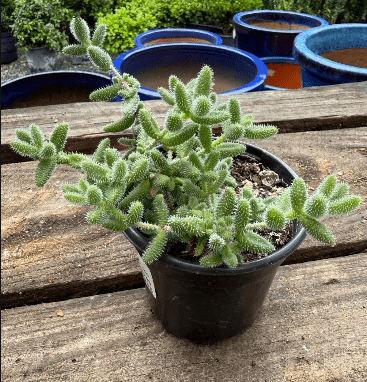Welcome to For Garden’s Sake, where we’re passionate about unique and delightful additions to your garden. We’re thrilled to feature the charming Delosperma Pickle Plant in our collection. This quirky succulent is not only a conversation starter with its pickle-like leaves but also a resilient and low-maintenance beauty that brings vibrant color and texture to any space. We adore its cheerful, daisy-like flowers that bloom profusely and its ability to thrive with minimal care, making it perfect for both novice and experienced gardeners. The Delosperma Pickle Plant is a wonderful way to add a touch of whimsy and enduring appeal to your indoor houseplant collection.
Characteristics and Growth:
The Delosperma Pickle Plant is a low-growing, spreading succulent recognizable by its small, fleshy, cylindrical leaves that resemble pickles. It typically reaches a height of 2-4 inches and can spread up to 12-24 inches, forming a dense mat. This plant produces vibrant, daisy-like flowers in various colors, which open during the day and close at night, blooming profusely in spring and summer. Its growth is generally rapid under optimal conditions, making it a charming addition to your home. Because this plant grows in zone 10-11, they make a perfect indoor houseplant for those of us living in the greater Triangle area.
How to Care For It:
To ensure the Delosperma Pickle Plant thrives, provide it with at least 6-8 hours of direct sunlight daily. Water sparingly, allowing the soil to dry out completely between waterings to prevent root rot. Use a well-draining soil mix, such as one formulated for cacti and succulents, and consider adding perlite or sand for improved drainage. While it can tolerate a wide range of temperatures and light frost, protect it from freezing conditions. Fertilize lightly during the spring and summer growing season with a diluted, balanced succulent fertilizer. Propagation is easily achieved through stem cuttings that have been allowed to callous before planting in well-draining soil.
When It Isn’t Happy:
The primary sign of an unhappy Delosperma Pickle Plant is often related to overwatering, which can lead to root rot. Ensure the soil is allowed to dry out thoroughly between waterings. Drooping or mushy leaves are indicators of this issue. Additionally, inspect the plant for pests such as mealybugs or aphids and address any infestations promptly. Lack of flowering or stunted growth can indicate insufficient sunlight, so ensure the plant is receiving at least 6-8 hours of direct light daily. Adjusting watering habits and ensuring adequate sunlight are usually the key to restoring the plant’s health and promoting blooming.
We hope you find this information helpful as you navigate growing indoor houseplants in the Durham/Raleigh/Chapel Hill area. For Garden’s Sake is just a hop, skip and a jump away for all your gardening needs! See you soon.

